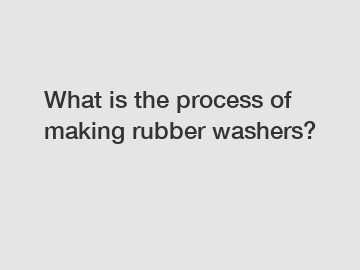What is the process of making rubber washers?
The process of making rubber washers involves a series of intricate steps that transform raw materials into essential components used in various industries. In this article, we will explore the journey of rubber washers, from their humble beginnings to their significant impact.
Rubber washers are primarily made from synthetic rubber compounds, which are derived from a mixture of chemicals and elastomers. The process starts with the formulation of the rubber compound, where various ingredients are carefully measured and combined. These ingredients typically include polymers, fillers, curing agents, accelerators, and processing aids. The specific composition of the rubber compound depends on the intended application of the washers.
Once the rubber compound is prepared, it is fed into a rubber molding machine. The machine utilizes heat and pressure to shape the rubber into the desired washer form. The mold itself may have various cavities, allowing for the production of multiple washers simultaneously. The machine applies controlled pressure to ensure uniformity and accuracy in the final product.

After the rubber washers are molded, they undergo a curing process. Curing involves the application of heat to promote cross-linking between the polymer chains in the rubber compound, resulting in improved strength and durability. The curing temperature and time are carefully controlled to achieve the desired properties in the washers.
Once the curing process is completed, the rubber washers undergo finishing touches to remove any excess material and ensure smooth edges. This step may involve trimming, buffing, or grinding, depending on the specific requirements of the application.
The production of rubber washers is a critical process with significant implications. These simple components play a crucial role in various industries, including automotive, plumbing, and electrical. Rubber washers are used to create watertight seals, prevent leakage, reduce vibration, and provide insulation. They act as a barrier against moisture, chemicals, and harsh environments, ensuring the longevity and performance of the equipment they are used in.
In addition to their functional importance, rubber washers contribute to sustainability efforts. By preventing leaks and reducing the need for frequent maintenance, they help conserve resources and minimize waste. Furthermore, the use of synthetic rubber compounds allows for flexibility in design and customization, catering to diverse applications and requirements.
In conclusion, the process of making rubber washers involves careful formulation of rubber compounds, molding, curing, and finishing touches. These simple components have a profound impact on various industries, ensuring functionality, durability, and sustainability. As we appreciate the complexity behind their production, we can truly recognize the value of rubber washers in countless applications.
Contact us to discuss your requirements of cloth rubber oil seal supplier, special shapes rubbers supplier, o ring colors. Our experienced sales team can help you identify the options that best suit your needs.

Comments
0